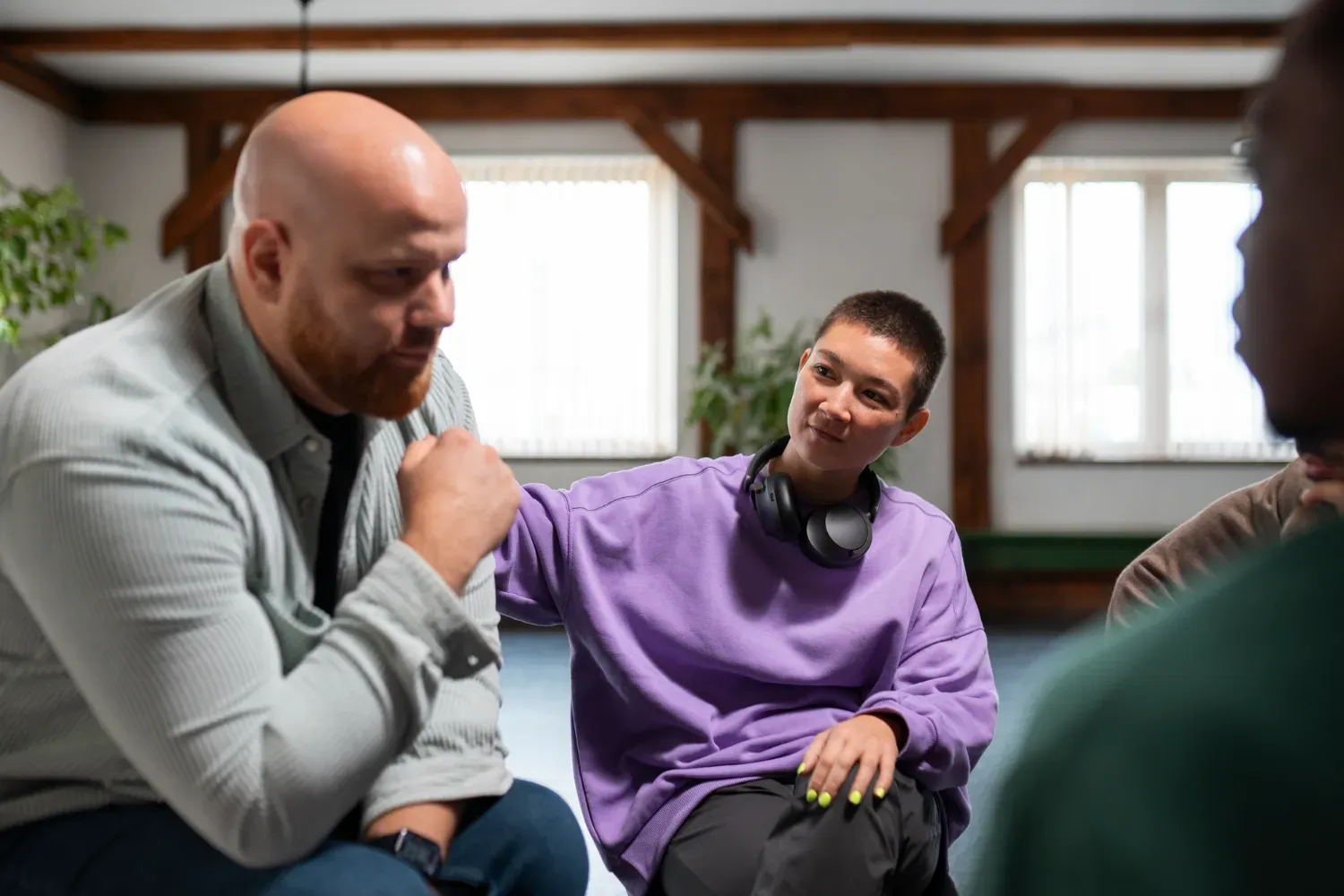What Does Trauma Therapy Do?

Trauma therapy is a specialised form of mental health treatment aimed at helping individuals who have experienced traumatic events. Our therapist, Niki Gelekis, is a mental health professional specialising in trauma therapy to assist clients in processing their trauma, reducing symptoms of post-traumatic stress, and ultimately leading healthier and more fulfilling lives. This article will explore the various aspects of trauma therapy, detailing how it works, the different types of therapy available for trauma treatment, and the benefits it provides.
How Does Trauma Therapy Work?
Trauma therapy works by helping individuals process traumatic experiences in a safe and supportive environment. It involves various therapeutic techniques that enable clients to confront and understand their trauma, develop healthy coping skills and mechanisms, and integrate their experiences into their lives in a healthy way. Our therapist uses evidence-based practices to tailor the therapy to each client's specific needs.
Types of Trauma Therapy
There are several types of trauma therapy that our therapist employs, each with unique methods and goals. Here are some of the primary types of trauma focused treatments:
Cognitive Processing Therapy (CPT)
CPT is a form of cognitive-behavioural therapy specifically designed for individuals who have experienced trauma. It focuses on changing negative thoughts and beliefs related to the trauma memory or traumatic event. Clients work with our therapist to identify and challenge these thoughts, replacing them with more balanced and accurate ones.
Eye Movement Desensitization and Reprocessing (EMDR)
EMDR is a therapy that helps individuals with posttraumatic stress disorder process and integrate traumatic memories through guided eye movements. This technique is particularly effective for those with post-traumatic stress disorder (PTSD). Our therapist uses EMDR to help clients access and process traumatic memories, reducing their emotional impact.
Prolonged Exposure Therapy
Prolonged Exposure Therapy involves gradually exposing clients to trauma-related memories, thoughts, and situations that they have been avoiding. This exposure helps reduce the power these memories hold and allows clients to confront their fears in a controlled and safe environment.
Narrative Exposure Therapy
Narrative Exposure Therapy focuses on helping clients construct a coherent narrative of their traumatic experiences. By telling their story in a structured way, clients can process their trauma and integrate it into their life history.
Benefits of Trauma Therapy
Trauma therapy offers numerous benefits, helping individuals to heal and improve their quality of life. Here are some of the key benefits:
Feeling Better
One of the primary goals of trauma therapy is to help individuals feel better. By processing and understanding their trauma, clients can reduce symptoms of anxiety, depression, and PTSD, leading to an overall improvement in mental health.
Improved Daily Life
Trauma therapy can significantly less mental health symptoms and enhance daily functioning. Clients often find that they can manage stress better, maintain healthier relationships, and engage in daily activities without being overwhelmed by traumatic memories.
Safe and Supportive Environment
Our therapist provides a safe and supportive environment where clients can explore their past trauma without fear of judgement. This therapeutic setting is crucial for the healing process, as it allows individuals to open up and work through their experiences.
What to Expect in Trauma Therapy
Understanding what to expect in trauma therapy can help clients feel more prepared and comfortable. Here are some key aspects of the process:
Talking About Feelings
In trauma therapy, clients will discuss their feelings and experiences related to the traumatic experience or event. This open dialogue helps them process their emotions and gain insights into their reactions.
Learning New Skills
Our therapist teaches clients coping skills and techniques to manage symptoms of trauma. These skills can include relaxation techniques, mindfulness practices, and strategies for challenging negative thoughts.
Building a Support System
A critical component of trauma therapy is building a strong support system. This may involve family members, friends, or support groups who can provide additional emotional support and encouragement.
Trauma Therapy for Different Situations
Trauma therapy can be tailored to address various types of psychological trauma and different stages of life. Here are some examples:
Childhood Trauma
Children who have experienced trauma can benefit greatly from specialized therapy. Our therapist uses age-appropriate techniques to help children process their experiences and develop healthy coping skills and mechanisms.
Trauma in Adults
Adults may experience trauma at any stage of life. Trauma therapy can help them address the impact of these experiences, whether they are trauma related issues due to personal relationships, accidents, or other traumatic events.
Trauma Survivors
Survivors of trauma, such as those who have experienced violence, abuse, or natural disasters, can find healing through trauma therapy. Our therapist works with survivors to help them with trauma symptoms and regain a sense of control and safety in their lives.
Nurture Space: Your Partner in Healing
At Nurture Space, we are committed to helping individuals with mental health conditions heal from trauma and lead fulfilling lives. Our therapist, Niki Gelekis, brings expertise and compassion to each session, ensuring that clients receive the best possible care.
Ready to Start Healing?
If you are ready to start your healing journey, Nurture Space is here to support you. Our therapist will work with you to develop a personalised treatment plan that addresses your unique needs and goals.
Trauma Therapy Techniques
There are several effective techniques used in trauma therapy. Here are a few that our therapist may employ complex trauma treatment:
Cognitive Behavioral Therapy (CBT)
CBT focuses on identifying and changing negative thought patterns that contribute to emotional distress. It is highly effective in treating trauma-related symptoms.
Dialectical Behavior Therapy (DBT)
DBT combines cognitive-behavioural techniques with mindfulness practices. It is particularly useful for individuals who have difficulty regulating their emotions.
Trauma-Informed Care
Trauma-informed care involves understanding and considering the pervasive impact of trauma on a client's life. Our therapist ensures that the therapeutic environment is sensitive to the needs of those who have experienced trauma.
Movement Desensitization and Reprocessing (EMDR)
As mentioned earlier, EMDR is a powerful technique for processing traumatic memories. It helps clients reprocess and integrate these memories in a way that reduces their emotional intensity.
Trauma-Focused Cognitive Behavioral Therapy (TF-CBT)
Trauma-Focused Cognitive Behavioral Therapy (TF-CBT) is one of the trauma focused therapies designed for children and adolescents who have experienced trauma. It involves both the child and their caregivers in the therapeutic process.
How Trauma Therapy Helps with PTSD
PTSD is a common condition among individuals who have experienced trauma. Trauma therapy can be highly effective in treating PTSD. Here’s how:
Understanding PTSD
PTSD is characterised by intrusive memories, avoidance behaviours, negative changes in mood and cognition, and heightened arousal. It can significantly impact daily life and relationships.

Treating PTSD with Trauma Therapy
Trauma therapy addresses the root causes of PTSD by helping individuals process traumatic memories and develop coping mechanisms. Techniques like EMDR and CPT are particularly effective in treating PTSD.
Coping with PTSD Symptoms
Trauma therapy equips clients with tools to manage PTSD symptoms, such as flashbacks, nightmares, and hypervigilance. These skills can greatly improve their quality of life.
The Importance of a Supportive Environment
A supportive environment is crucial for healing from trauma. Here’s why:
Feeling Safe
Feeling safe is fundamental to the healing process. Our therapist ensures that the therapeutic environment is a safe space where clients can express themselves freely.
Building Trust
Trust is essential in trauma therapy. Our therapist builds a trusting relationship with clients, which is key to effective therapy and long-term healing.
Trauma Therapy for Different Ages
Trauma can affect individuals of all ages. Our therapist tailors therapy to meet the needs of different age groups:
Helping Kids
Children process trauma differently than adults. Our therapist uses play therapy and other child-friendly techniques to help young clients express their feelings and process their experiences.
Supporting Teens
Adolescents face unique challenges when dealing with trauma. Our therapist provides a supportive space for teens to talk about their experiences and develop healthy coping strategies.
Assisting Adults
Adults often have more complex trauma histories. Our therapist works with adult clients to address these complexities and develop personalised treatment plans.
The Role of Family in Trauma Therapy
Family support can be a critical component of the healing process. Here’s how family involvement can help:
Family Support
Family members can provide emotional support and encouragement to individuals undergoing trauma therapy. Their involvement can strengthen the therapeutic process.
Family Therapy
In some cases, family therapy may be recommended. This is trauma focused therapy involves working with the entire family to address the impact of trauma and improve communication and relationships.
How to Get Started with Trauma Therapy
Taking the first step towards trauma therapy can be daunting. Here’s how to get started:
Finding a Therapist
The first step is finding a qualified therapist. Nurture Space offers specialised trauma therapy services with our experienced trauma therapist, Niki Gelekis.
Making the First Appointment
Once you have found a therapist, schedule your first appointment. This initial session is an opportunity to discuss your needs and goals for therapy.
Preparing for Therapy
Preparing for therapy involves reflecting on your experiences and being open to the therapeutic process. Our therapist will guide you through this preparation.
Moving Forward with Trauma Therapy
Trauma therapy is a journey. Here are some steps to help you move forward:
Setting Goals
Setting clear goals for therapy can help guide the process. Our therapist will work with you to identify and achieve these goals.
Tracking Progress
Tracking your progress in therapy can provide motivation and insight. Our therapist will help you monitor your improvements and adjust the treatment plan as needed.
Staying Committed
Commitment to the therapeutic process is key to achieving lasting change. Our therapist will support you every step of the way, helping you stay focused on your healing journey.
Conclusion
Trauma therapy is a powerful tool for healing from traumatic experiences. At Nurture Space, our skilled trauma therapist, Niki Gelekis, is dedicated to providing compassionate and effective therapy tailored to each client's needs. If you are ready to start your healing journey, reach out to us today. We are here to help you move forward and reclaim your life.



